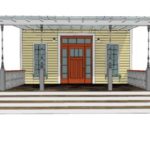You think of New Orleans as this wonderful food city, and it is,” said Sanjay Kharod, executive director of the New Orleans Food & Farm Network, a food-justice organization dedicated to increasing access to local foods. “But there is a lack of food and vibrant economy in some neighborhoods. We want to build those people up as well.”
To raise awareness of sustainable urban farming and help bolster the local economy, the New Orleans Ernest N. Morial Convention Center is partnering with the Food & Farm Network and the Recirculating Farm Coalition to create the first urban-farming center on convention-center property — on a 2.5-acre site just a few blocks from the main building.
“There’s obviously a big trend of farm-to-table,” said Tim Hemphill, vice president of sales and marketing for the convention center. “Given that we plan to construct an urban farm on our property, we’re going to experience that phenomenon in the closest way possible. The produce will be used in part by Centerplate, our catering company, and the herbs and everything else will become a part of our menu options.”
Called Growing Local NOLA, the farm will be used not just to produce food but also for research, education, training, and community engagement. “We are looking to establish training at the convention center,” Kharod said. “We want to show people how to cook great local food, show them where it comes from, and get them more interested. We’d like the center to become a leader in local food sourcing.”
The idea for the project came two years ago when Hemphill approached the Food & Farm Network about collaborating with the Louisiana Restaurant Association in some capacity. “We started talking about how we should do an urban-farming expo,” Kharod said. “The National Food Coalition had just disbanded, and one reason they disbanded was because regional activity is much more important — what happens in New Orleans is very different from what happens in Detroit.”
At Growing Local NOLA, the Recirculating Farms Coalition will provide a water-based farming system that combines hydroponics — growing plants with recycled water — and aquaponics, which involves growing plants that are fertilized by fish. (Read a Convene blog post on aquaponic farming at convn.org/aquagardens.) Both methods will produce fruits, vegetables, and herbs in high yields using little space, ideal for an urban setting. There will also be soil-based growing — including a fruit-tree orchard — along with a classroom and kitchen for training and presentations, and event space.
“The idea is for it to become a community space,” Kharod said, “and the convention center would be part of that. When there is a conference coming in, and when planners come in, we want the farm center to be a resource for them.”
The plan is to eventually establish a farmers’ market and on-site café. Kharod hopes the project will become a “gateway for people to understand all the different aspects of urban farming.”
Local Roots
“Having a training center is important,” said the New Orleans Food & Farm Network’s Sanjay Kharod, “because you can’t just take a piece of property and say, ‘Hey, this is a farm.’” Kharod plans to utilize the expertise of the Food & Farm Network’s partners, and other local farmers, to help maximize the impact of Growing Local NOLA. “People need to be mentored by these local farmers in order to help them incubate these businesses,” he said. “This is how the training center came [about]. We asked, ‘What are the gaps in the system, and how can we make the system a whole?’”
More Resources
To find out more about Growing Local NOLA, visit noffn.org.



